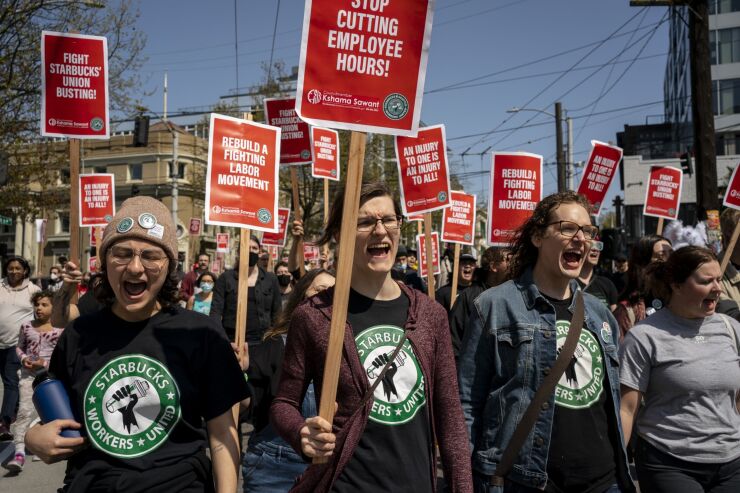The American union is making a comeback. After decades of declining power, new labor organizations are sprouting up at prominent businesses across the country, from Amazon to Starbucks.
The workers organizing at these companies are demanding more from their employers, including better retirement benefits — which raises a question: Is there an opportunity here for financial advisors?
"It's true that probably the average Starbucks worker or somebody like that is not likely to need or be able to afford one-on-one, bespoke financial advice," said Monique Morrissey, an employee benefits economist at the
Last year saw worker uprisings at some of America's most famous corporations. In April 2022, workers at a warehouse in Staten Island, New York, formed the first union at Amazon. In September, workers unionized at the media company Conde Nast. And from December 2021 to the present, employees at almost 300 Starbucks stores have voted to join the union Workers United.
For now, many of these unions are focused on more short-term concerns than retirement: higher wages, better schedules, safer working conditions and other details of their contracts. A representative for the Amazon Labor Union, for example, told Financial Planning the union is not yet seeking specific retirement benefits. But it does mention
"This Union is established to improve the wages, benefits, working conditions, terms of employment, job security, and general welfare of its members and other workers and to organize unorganized workers of Amazon," the founding document says.
In the meantime, plenty of older, more established unions already work with financial advisors. These partnerships provide a model for how wealth managers could work with the labor organizations of the future — and show how mutually beneficial such collaborations can be.
Ron Whittingham is one of the two CEOs of
"As a planner, the beautiful thing about these union employees is that the job's kind of done for us," he said. "These workers are actually earning money every hour toward their retirement plan, from day one of the job."
Unions are highly effective at getting their members to save. According to the
They also have higher participation rates. Eighty-four percent of organized workers who have access to retirement plans actively pay into them, compared to only 49% of non-union employees, according to the DOL.
"Financial planners have a big incentive to support unions because unions make workers focus on retirement and on investment," Morrissey said. "There's evidence that unionized workers that have pension plans also save more in 401(k)s. Once you become attuned to the importance of saving for retirement, even if you have better benefits, you're more likely to also be saving more."
But not every worker understands — or is even aware of — all the benefits they're being offered. That's where an advisory firm like Megent can step in.
"What we do is we go into the union halls and we educate the participants on their union plans," Whittingham said. "'When can I retire? Do I take a spousal benefit? How do I protect my family with the different options I have?' There's obviously a lot of financial anxiety about retirement, and we try to alleviate that by showing what their income is going to be — so at least they know, years in advance of retirement, that they're going to be able to make it."
But even among union workers, there are still some gaps in plan participation. For many of the defined-contribution plans sponsored by unions, enrollment is not mandatory. This opens up a second role for advisors: nudging clients to sign up."We have a couple of unions that have typical 401(k) plans," Whittingham said. "That definitely is a space for advisors to take advantage of, because a lot of these workers are not automatically enrolled in some sort of 401(k) or defined-contribution plan. They have to be educated on why that's a good benefit."
To reach these clients, Megent has partnered with the
"Our unions have access to financial planners for free, from the day they walk into the union to the day they pass away," said Ken Edwards, executive director of MCL. "And if they pass away first, our financial planners will sit with their spouse."
What's in it for the advisors?
"Numbers," Edwards said.
"If you're at Megent Financial and you're along for this ride with the Midwest Coalition of Labor, you started with probably two or three unions that you did business with in Chicagoland," he said. "Now, all of a sudden, you have access to 400 locals."
As other, newer unions develop, they may offer similar opportunities for wealth management. First they need to fight for better retirement benefits.And even before that, they need to negotiate new contracts with their employers — something the unions at Starbucks, Amazon and Conde Nast have yet to accomplish.
Edwards expects the negotiations to be tough. Starbucks Workers United, for example, has unionized about 300 stores. Their employer, the Starbucks Corporation, has more than
"They're certainly not negotiating a position of strength," Edwards said. "It's heartening to see them having this kind of upsurge, but I also don't envy them going up against Starbucks."
But that's not a case for timidity. When it comes to bargaining for retirement benefits, Edwards has some advice for the newer unions.
"Hey, Starbucks! Hey, Amazon! Ask for a pension," he said. "You're dealing with a company that has more money than God. Shoot for the moon!"








